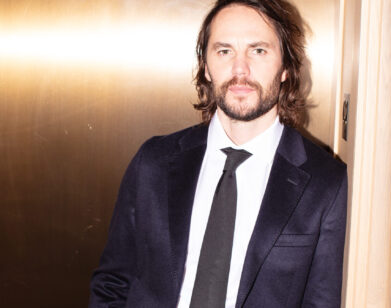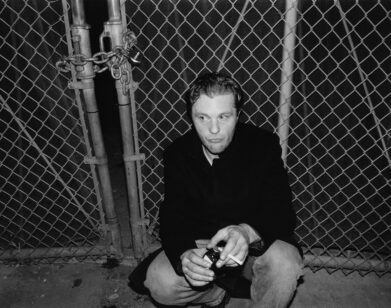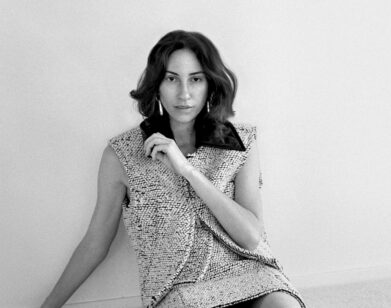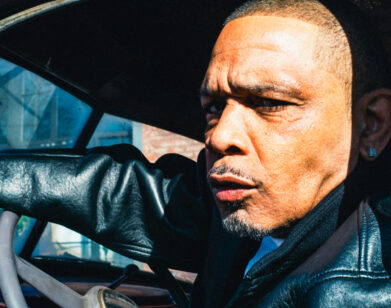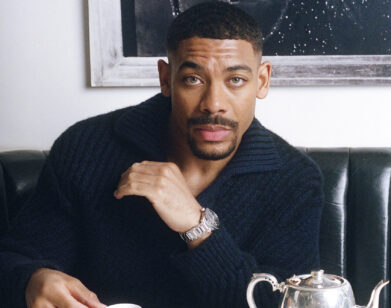The Idol and the Power of Art
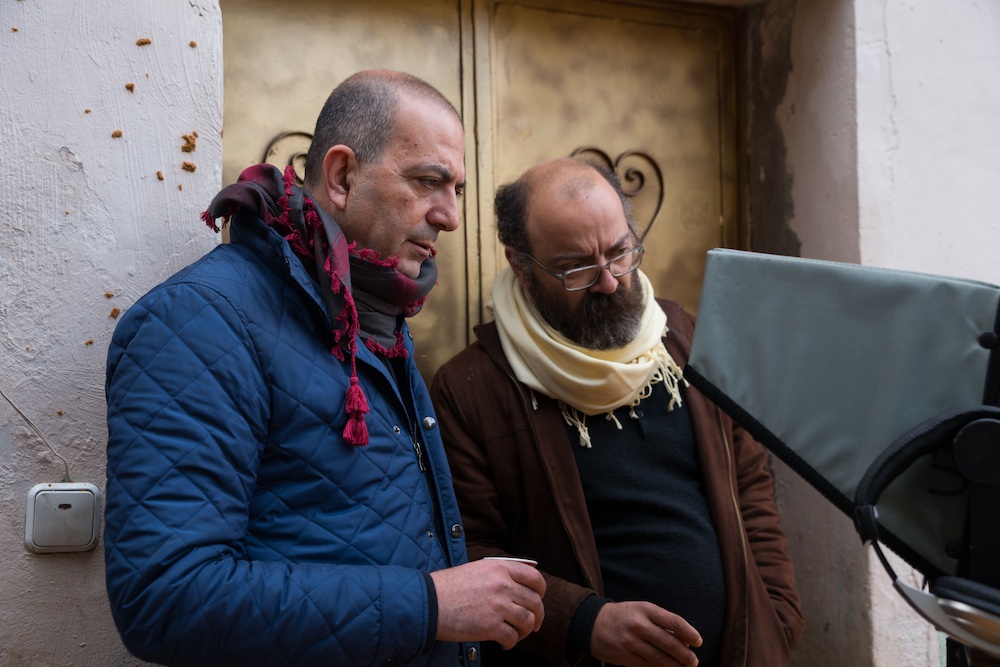
ABOVE: HANY ABU-ASSAD (LEFT) ON THE SET OF THE IDOL
After a 15-season run featuring an unprecedented eight consecutive years as the top rated program on television, the juggernaut singing competition show American Idol came to an end last month. Featuring celebrity judges, the reality show captured the imagination of tens of millions of viewers who spent nights glued to the screen, dutifully dialing in votes for their favorite contestants. Americans eventually lost their fanatical devotion to the show, but the Idol franchise has spread across the globe to almost 50 different regions and has touched an estimated 6.5 billion viewers.
The second season of Arab Idol, successor to an earlier iteration of the show called Superstar, became a global phenomenon in 2013 thanks to Mohammed Assaf, a pop singer from Gaza whose incredible rags-to-riches story made him a symbol of hope and pride in Palestine. The competition was held in Egypt and was open to singers from across the Arab world. Assaf’s long journey from a wedding singer in Gaza to the international stage is now the subject of a biopic called The Idol, written and directed by Hany Abu-Assad. Now in his 50s, Abu-Assad isthe only Palestinian filmmaker to be nominated for the Academy Award for Best Foreign Language Film—a honor he received twice, once in 2006 for Paradise Now and again in 2014 for Omar.
Abu-Assad’s Palestinian identity is at the core of his films, which tell intimate and politically charged stories about the daily struggle of people living in conflict-stricken territories. His breakout film Paradise Now, for example, was a controversially humanizing portrait of two Palestinian suicide bombers. For The Idol, authenticity was key to the director, who fought to shoot as much of the film as he could on location in Gaza. The choice paid off, giving a tangible sense of place to Assaf’s experiences. Memorable shots of crumbled buildings serve as a chilling reminder of the the Palestinian-Israeli conflict which, while never overtly discussed in The Idol, makes its presence felt.
Interview sat down with Abu-Assad in Tribeca, where the director was a juror at the Tribeca Film Festival, to discuss The Idol, the challenges of shooting in Gaza, and filmmaking as a political act.
WIL BARLOW: How did you first hear about Mohammad Assaf?
HANY ABU-ASSAD: I was at the Cannes film festival with the film Omar. It was in the competition Un Certain Regard, and I won the Jury Prize, which is prestigious. I was happy to get the prize. After the prize, my sister asked me what I was going to do, and she told me his story. I don’t follow these shows. When I heard the story I said, “Wow, is this real?” He can’t go outside of Gaza, it’s under siege, a big jail, he escapes, he was late, he managed to climb over the wall, he was thrown out, somebody gave him the ticket when they heard his singing… it was an amazing story. I followed the last episode and when he won I was happier for him than when I won Un Certain Regard, because I think his winning meant something to all of us. The win in Cannes was just for me. When somebody wins and it means something bigger, it really hits you. You realize how important art is. Art can really, really, in times of darkness, be the light at the end of the tunnel. It was amazing to see that. I felt I should do a story about it.
BARLOW: What kind of research did you do when you were writing? Did you meet with Mohammad?
ABU-ASSAD: Yes. I met him, I met his family, I went to his house, I went to Gaza. I spoke to friends of his. But it’s a fictionalized story. For example, the sister is real, but I combined two sisters. The one who was with him in the band was not the one who was encouraging him because she was sick. I made them one. These kind of things.
BARLOW: In some ways the film is a coming of age story and in some ways, especially when he has to sneak out of Gaza to get to the audition, it becomes almost a political thriller. How did you balance those two aspects of the film?
ABU-ASSAD: Actually, not consciously. It’s not like I’m really aware of 100% of what I’m doing. I always follow what I feel. Feeling in science is bad, because feeling and emotion can heighten your vision and you can’t see reality. In art it’s the opposite. In art feeling will let you see reality. It’s a different dynamic. You need a lot of knowledge to make movies. You need to know all the genres, the cinematic movements in history, the development of cinema language, you have to know all these rational things. But when you are doing, you are not really aware of, “How am I going to balance this?” You do it according to your feeling. That’s the most important thing in art, I read a lot of books, I analyze films rationally, but when I’m doing, I’m feeling.
BARLOW: I read that before you were a filmmaker you worked as an airplane engineer. Do you think that experience affects your process as a filmmaker in some way?
ABU-ASSAD: I think it helps me [separate] emotion and rationality. The intellectual side of you that can look to things without emotions is very important. Being an engineer helped me in developing this side of looking to facts, looking to things without emotion. It’s also important in moviemaking. When you finish, you can look back to it with rational thinking and see how it was constructed. Not just my movies, any movie.
BARLOW: What was it that made you want to become a filmmaker?
ABU-ASSAD: Many reasons. The first, I think, was when I saw One Flew Over the Cuckoo’s Nest. I was about 14, and that movie hit me so deep. After seeing that movie, I thought, “I want to be a filmmaker.” This is one of the reasons. The second is that filmmaking is more attractive to women. You become more attractive to women. [laughs] Same body, same mind, but the idea of filmmaking is more attractive to women. Also, with me as a Palestinian, there’s an urgency to fight injustice. There was enormous injustice done to us. How are you going to fight it? Grab weapons and kill others, and end up being killed? Or do art that will stay in history, hopefully? Nobody can defeat it. What I realized when I was making art is that art is bigger than life. There’s no tank or anything that can destroy ideas. This is so strong; you can challenge the biggest power on Earth with your art.
BARLOW: Do you consider yourself a political filmmaker?
ABU-ASSAD: Yes. Thank God we’re not just entertaining, or [making] art for art’s sake. “Art shouldn’t say anything.” What? What are you going to say? Nothing? It’s just a beauty? Entertainment and beauty in art is important, I acknowledge that, but you have to say something and then it’s immediately political. If you define yourself as a Palestinian filmmaker, [even] if you do a story about tea and coffee and cigarettes, it’s still political because you define yourself as a Palestinian. Why? Because the occupier wants you to delete your identity. This is how they can continue their occupation. After all this destruction of society, controlling land, controlling life, and still you define yourself as Palestinian, immediately it’s a political act, because you say to the occupier, the people who want to destroy your identity, you tell them, “Fuck off.”
BARLOW: So for this film, you had the opportunity to shoot in Gaza.
ABU-ASSAD: Yes, we couldn’t shoot more than two days. The Israeli army gave us just two days. We shot as much as possible, but the rest we shot in the West Bank, Jenin…
BARLOW: Why was it important to shoot as much as you could on location?
ABU-ASSAD: It’s crucial for the authenticity. You can’t duplicate Gaza. And you can’t duplicate the power of Gaza. I think why Israel is punishing Gaza so hard is that the spirit of the people is so high. Over the years they’ve tried everything to destroy the spirit, and their spirit is still amazingly high. It’s an undefeatable city. You need this real location to express the spirit of Gaza.
BARLOW: Were there special challenges associated with filming there?
ABU-ASSAD: Oh, yeah. To get permission was difficult, it was waiting and waiting. To get the children [actors] out of Gaza was almost a military operation. Tons of papers; tons of waiting and calling. Three people were constantly working on that matter, to get those four kids out of Gaza.
BARLOW: How did you cast those four young actors?
ABU-ASSAD: Skype. Because I couldn’t go there. God bless technology.
BARLOW: One of the things that stuck with me was towards the end when you introduce the real Mohammed Assaf and real people celebrating his victory. What was behind that choice to include the real person in the film?
ABU-ASSAD: I can show you one of the reactions of someone who saw it recently. It was so nice to read. It shown at a children’s film festival in New York: “Great choice to change the real person at the end. The actor wouldn’t have been able to remake it.” Which is so true. He got it. The reason was that I felt like this moment is impossible to remake. Even if you have the best actor in the world. The tension in his face was so real, and when he cried, and he collapsed.
BARLOW: A lot of your past films have dealt with really dark subject matter, and this one seems to be a lot more optimistic.
ABU-ASSAD: I’m so happy I did that. From now on I’m going to be more hopeful.
THE IDOL COMES OUT IN LIMITED RELEASE THIS FRIDAY, MAY 27.

